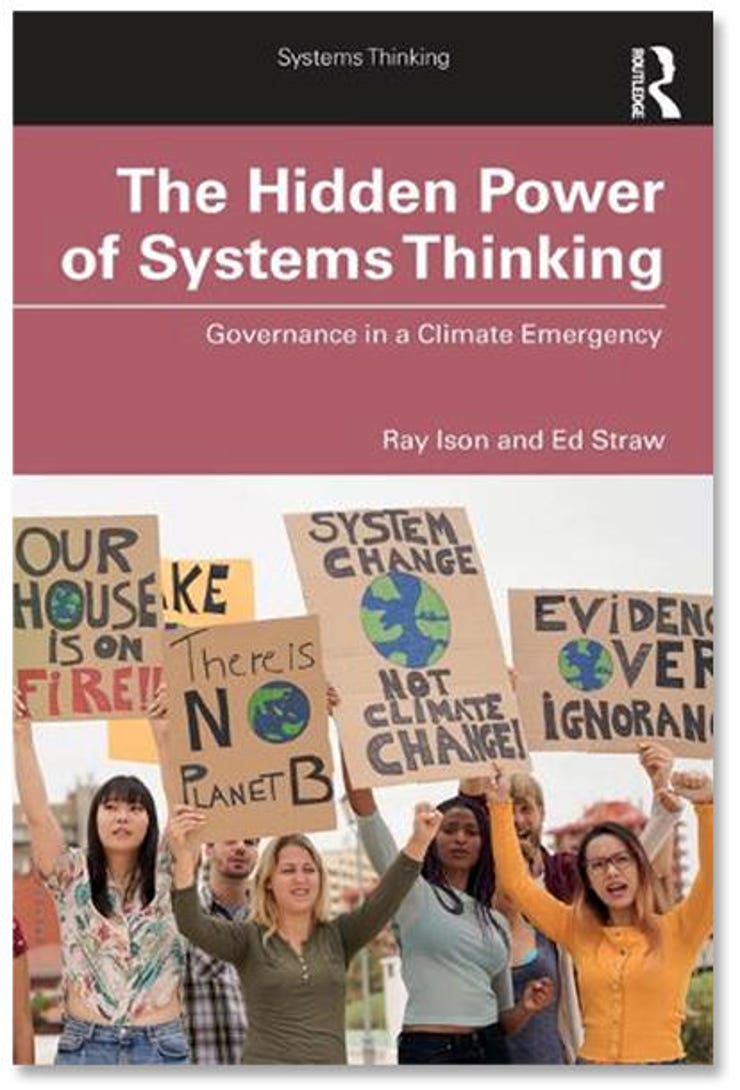The Hidden Power of Systems Thinking, book review: Reinventing governance


The Hidden Power of Systems Thinking: Governance in a Climate Emergency • By Ray Ison and Ed Straw • Routledge • 340 pages • ISBN: 978-1-138-49399-5 • £34.99
The difficulty of pulling the world together to react collaboratively in the face of an urgent existential threat has been thoroughly demonstrated over the past year. The coronavirus pandemic has made it clear, even in countries not struggling with Brexit-related upheaval, just how hard it is to overcome the instinct to embrace nationalism when it comes to controlling outbreaks and sharing vaccines.
The bigger problem we must tackle as part of post-pandemic recovery is climate change, which will require all that elusive collaboration, and more. Yet numerous countries' governments not only fail to collaborate with each other, but they also fail to respond to their own citizens' needs.
The need for broad-picture thinking to address these gaps is the central thesis of two Open University academics -- professor of systems Ray Ison and visiting fellow Ed Straw -- in The Hidden Power of Systems Thinking: Governance in a Climate Emergency.
'Systems thinking' is one way to put it. Another is 'cybernetics' -- arguably the most important discipline most people have never heard of. The temptation is to assume it has something vaguely to do with robots, which is wrong -- as the 50-year-old Cybernetics Society will tell you. Instead, it's the multi-disciplinary study of complex systems -- exactly the sort of thing we need right now.
This is the discipline that Ison and Straw apply to the climate crisis. In the first part of the book, they examine the reasons for governments' uncoordinated lack of response to date. In the second, they explore the practical application of systems thinking (STiP, or Systems Thinking in Practice). In the third and final section, they consider how STiP can be used to reinvent government systems, as well as help organisations and individuals make specific decisions about how to respond to climate change.
Perhaps their most controversial suggestion, at least for some of us, is to eschew mainstream media such as newspapers in favour of "different framings" -- they suggest New Scientist, the academic-led The Conversation and Investors Chronicle, plus a selection of YouTube commentators. The benefit, Ison and Straw suggest, will be to become less judgmental, opening the way to discourse with others with dissenting opinions. The goal is good, although I'm not sure YouTube is the answer.
Unintended consequences
Applying systems thinking, the authors assure us, is not hard; it's just rarely practiced. As in many examples from the past year, governments under pressure to do something do exactly that -- something. The resulting quick-fix patches carry with them unintended consequences that exacerbate the original problem. Collecting evidence and developing a broader understanding up front takes longer, but, argue Ison and Straw, the resulting solutions are more durable and cause less collateral damage.
The discipline itself may not be hard, but it requires the willingness to change. Adding the biosphere, the technosphere, and social purpose to our governance system, as the authors recommend, is far easier for those outside government than for those inside it -- we have more incentive.
RECENT AND RELATED CONTENT
Disruptive Innovation 2021: These 15 big ideas are most likely to change the world
Corporate climate action tech heats up
Climate change: Why it could be time to cut back on new gadgets and HD streams
IBM aims for net-zero greenhouse gas emissions by 2030
Amazon unveils its largest single renewable energy project ever
Read more book reviews
- Ask Your Developer, book review: How to prosper in a 'build or die' business landscape
- Lurking, book review: A people's history of online culture
- Augmented Reality, book review: Exploring the attractive and alarming potential of AR
- The Entrepreneur's Faces, book review: A compendium of startup stories
- Holiday reading roundup: How the future looked, before the pandemic